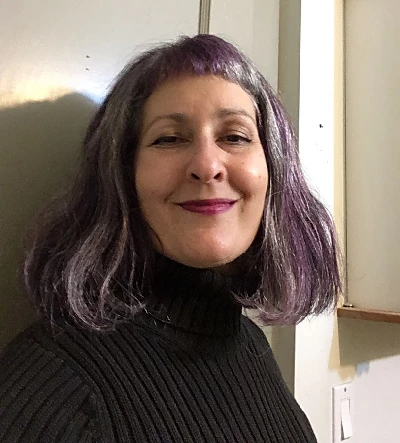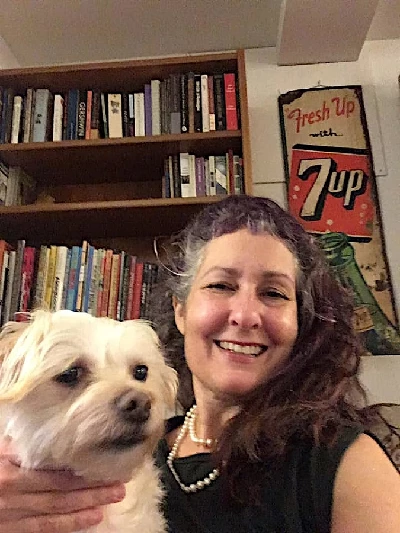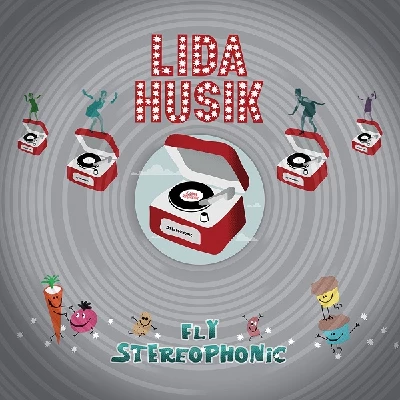published: 23 /
5 /
2022

Washington DC-raised singer-songwriter Lida Husik speaks to John Clarkson about her 1997 fifth album 'Fly Stereophonic', which is being released on vinyl for the first time for Record Store Day.
Article
Lida Husik is a Washington DC-raised but now Portland, Oregon-based singer-songwriter, who during the 1990s fervently recorded seven albums of indie rock on various labels including Shimmy Disc, Caroline Records, Astralwerks and Alias Records.
‘Fly Stereophonic’, the 1997 fifth of these, is about to be re-released in a 25th anniversary edition on vinyl for the first time for Record Store Day on April 23rd by Theodore Vlassopulus’s ever excellent Tongue Master Records (Mark Eitzel, Broken Dog, Sigmatropic, Last Harbour). Remastered at Abbey Road Studios and appearing on 180gm clear vinyl, it is limited in its vinyl edition to just three hundred copies.
Described by one approving critic at the time as sounding “like pop hits from another galaxy”, ‘Fly Stereophonic’ is an album of satisfying contrasts. It is minimal in tone. Husik plays its few instruments herself – guitars, Hammond organ, keyboards – other than the bass guitar which is played by Charles Steck. Only the last two tracks, ‘Chocolate City’ and ‘Dancing Pants’ clock in at over four minutes, and most of the other songs, the title track, ‘Fade Sister Cool’ and a beautiful cover of the Monochrome Set’s ‘Ein Symphonie des Grauens’, all run to little over half of that. More pop-orientated than most of her albums, but also embracing the folk and psychedelia which Husik became known for, it is packed with ideas, more discordant, spiky numbers being balanced with softer-edged tracks, and each song reshaping itself as it develops so that it finishes a distance from where it started from. ‘Fly Stereophonic’ serves of proof of how much can be achieved on imagination.
Pennyblackmusic spoke to Lida Husik about her 1990s career and ‘Fly Stereophonic’.
PB: You had been brought up in Washington DC but ‘Fly Stereophonic’, despite being your fifth album, was the first album that you recorded there. Washington DC is usually remembered in the 80s and 90s for its hardcore and grunge scenes, but your music does not slot into either category. What are your memories of its indie scene during that period. Was it more diverse than it is sometimes portrayed?
LIDA HUSIK: I actually began my music career in Washington DC, recording with the kind and amazing Don Zientara at Inner Ear (Fugazi and a million gazillion other bands), and when I met Kramer of ShimmyDisc Records in NYC he heard those songs and recorded several more. The combo of those two sessions became my first full-length record, ‘Bozo’. Later I recorded my first Caroline release ‘Joyride’ in DC at WGNS studio with Geoff Turner and Charles Bennington. ‘Fly Stereophonic’ and ‘Mad Flavor’ were also recorded there. So actually the bulk of my musical output is straight out of Chocolate City!
Punk rock kind of exploded in my high school where Dischord Records was born. It was like a refreshing splash of cold water on a mind-numbingly hot day- it just made everything fun all of a sudden. And we were young and angry and in the nation's capital on the day Reagan was elected, from which you can draw a straight line to the pile of shit we are all trying to rise above now as a planet.
So, that energy and spirit of rebellion was very real in DC. Since I was musical, I loved the new wave music that was in the air, and the go-go music that was beating the heart of the black city. The funnest thing was to buy old vintage clothes and rip them up and cover them with safety pins and badges, and get on the bus. It was very new then, so people were very freaked out by punk. It was wonderful!
PB: You had previously worked with Kramer and Beaumont Hannant, but ‘Fly Stereophonic’ was produced by Charles Bennington, who you worked with again on ‘Mad Flavor’. What do you think he brought to ‘Fly Stereophonic’?
LH: Charles and also Geoff Turner had done a first pass of mixing, and Alias Records wanted a final mix at their state of the art studio in L.A. So, Charles and I sat at a mixing board the size of a racket ball court and it was intense work on a time budget. Charles is a very erudite and creative individual, as is Geoff. Charles also played the sax on a couple of songs on the record, and he always had the manner of a beatnik crossed with an English lord (he is part British). So, along with a flawless ear, he brought a sense of elegance to the mix, and was charming company to boot. I have always sat in on the mix and shared ideas and requests with the producer, so I also appreciated that Charles appreciated that they were my songs, and I had a vision for them.
PB: You have published several very brief but excellent short stories and pieces of memoir on your website. They take an off-kilter and abstract look at the world but one very much centred in reality. It seemed on ‘Fly Stereophonic’ that you were attempting to do something similar with the lyrics. Do you agree?
LH: Thank you! Well, I am not sure that anything is ever as intentional as that, I wish it was, but I would say my lyrics are a combination of trying to express or expunge childhood grief, and to express rage and sadness about the state of the country, the earth, existence, etc...because my music is aurally seductive and poppy, although those who don't pour over lyrics would never know. I try to use metaphor and a secret language of personal symbols. On the record I am working on right now with my band The Incarnations, I seem to be able to be a bit more blunt. But in my youth the idea of writing a pop song about early mother loss and yearning was weird. It didn't fit in. Most songs were about relationships with the living. Or “I hate the government, everything sucks", a sentiment I agreed with but could not express in that way. So instead I write something like, "And the leader they chose had his pockets all over-flowing, the grease of the pterodactyl, the oily tyrannosaurus," meaning Bush and his fossil fuel family on the single, ‘Nuclear Soul’.
PB: -Why did you decide to cover the Monochrome Set’s ‘Ein Symphonie die Grauenss’ on ‘Fly StereophoniV?
LH: I had seen the band play at literally like, the student cafeteria at American University in 1980, and very few people were there. I had their record with that song on it, and I thought it was genius. Years later when playing the few tiny, brokedown, fleeing-the-dustbowl type 'tours' I did, I comforted myself with that memory when playing to empty clubs.
Bid actually got mad at us and accused us of using his vocals. He could not believe that it was me singing, and refused to believe that we hadn't used the original track in some sneaky way, aside from the very beginning radio bit which we sampled. I was quite flattered, actually.
PB: The songs on ‘Fly Stereophonic’ are all really short, nothing more than four minutes and the majority coming in around the two minute mark or even less. Why did you decide to do that, especially as all the songs on your previous album ‘Green Blue Fire’ are really long in comparision?
LH: I don't recall consciously doing that, but maybe I was aware of how long previous tracks had been and wanted something snappier.
PB: It is a really lo-fi record. You play all the instruments, other than the bass guitar, yet you pack an enormous amount of ideas into it and none of the songs finish where they started from. Was that your aim with ‘Fly Stereophonic’, to record something at one level minimal but with a lot going on?
LH: No, I never thought of it as very lo-fi actually...I always have a lot going on because that is how I write, how my brain works. I have to add complexity by layering. And it's my joy, so I indulge it. The lo-fi-ness of it is beyond my control, having to do with the studio I record in. It was not a conscious choice. I'm not even sure if I could hear something as lo or hi fi. It's not something I pay attention to, although I know my records sounds smaller than, say, big top 40 hits.
And, yes, I play all of the instruments except the blistering sax, soaring bagpipes by Eugene Bogan, and The Rummager (Jay Spiegel), the tightest drummer I have ever known, playing eighth notes on the triangle for over four minutes on ‘Chocolate City’, and everything else we threw at him. I can't say enough how the combo of Rummy and Steck made both ‘Fly Stereophonic’ and Joyride the records they are.
‘
PB: Who designed the amazing cover art for ‘Fly Stereophonic’?
LH: The cover was designed by a fantastic artist and dear old friend named Bill Thelan, a.k.a. Lump Lipshitz, and his new work can be seen @mydadgavemethat on Instagram.
PB: ‘Fly Stereophonic’ was released on Alias Records, who had also released records by American Music Club and Yo La Tengo. You had previously been on Shimmy Disc and Caroline. How did Alias compare to those two labels?
LH: Alias was tiny compared to Caroline/Astralwerks and there wasn't a lot of staff energy available to promote the three records I did for the label. I, however, got to live in LA and hang out with really fun people, which was a pleasure. I was not then, nor have I ever been, much of a careerist in my music life.
PB: You recorded a remarkable seven albums in an eight-year period between 1991 and 1999. How easy is it for you to relate now to the young woman with all this fervent energy who recorded all these albums?
LH: Oh, I relate very well! I have very happy memories of the really active years of making records. Of course, I wish I had had the skills back then that I have acquired since...I would have done a lot of things differently, and maybe had more success. But things unfold the way they do, and luckily I still have the chops to keep making music and really enjoying it more.
PB: Your musical output has been rare in recent years. You recorded a single ‘Nuclear Soul’ in 2006 and an album ‘Motheroceanmorning’ in 2018, both of which were only made available digitally. Why have there been such long gaps in the amount of music you have releases and those releases been so low key?
LH: Oh dear, did you miss ‘Future Ghosts of America’? It was an EP, also digitally released, in 2016. It was a collaboration with a Danish singer-songwriter and cellist named Soma Allpass, and it was one of the joys of my life to record these songs with her back in 2005 and take over ten years to release them! The record has other fine Portland musicians on it as well.
But to answer your question, I guess when you don't have a record label behind you there is not much incentive, and life has many meandering ways. I had seven lovely years working at the Library of Congress in art conservation, and I was very absorbed in that world and not motivated to try and find a label. That was when I released ‘Nuclear Soul’ on my own. In the past few years I have studied to become a yoga therapist, which keeps me very busy now.
And I have a wonderful three-piece band, Paul Montone on bass and Luke Strahota on drums, and we are recording here in Portland. For this one, I actually would love it to be on a label, as it's my first proper band release in many years! So, it has an energy and a collaborative feel unlike my solo stuff. I am really excited about it!
PB: Were you surprised when Theo Vlassopoulus at Tonguemaster got in touch, offering to reissue the album on vinyl, just in time for its 25th anniversary?
LH: Yes, I was very happy that Theo offered to re-release Fly, and thrilled to be included in Record Store Day 2022! It's been a lot of fun just re-living the experience.
PB: Thank you.
Band Links:-
http://www.lidahusik.net/
https://www.facebook.com/Lida-Husik
Play in YouTube:-
Picture Gallery:-

